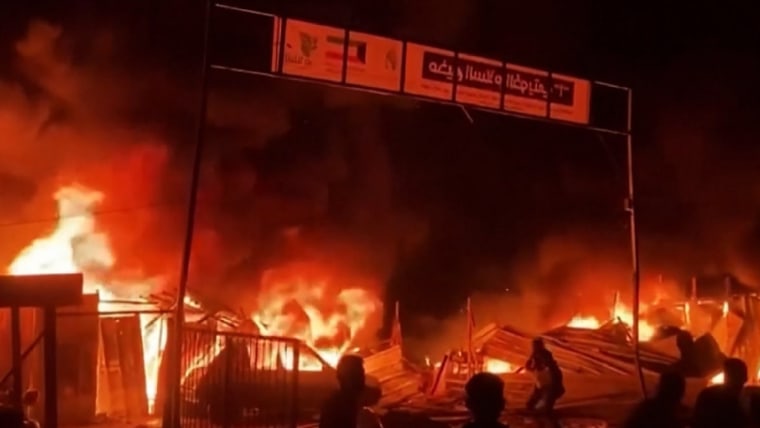Earlier this year former President Donald Trump made a couple of comments about Israel’s military operation in the Gaza Strip that were difficult to get a read on. “You have to finish up your war. To finish it up. You gotta get it done,” he told the Israeli newspaper Israel Hayom in March. The next month he told the conservative radio talk show host Hugh Hewitt that Israel is “absolutely losing the PR war” and that the country should “get it over with and let’s get back to peace and stop killing people.”
Some newspapers and political analysts interpreted Trump’s comments as more critical of Israel’s strategy than President Joe Biden has been — and possibly more dovish. “Trump arguably went a step further than Biden, who hasn’t explicitly called for an end to the war,” Axios reported in response to Trump’s March comments. Some right-wing supporters of Israel’s military operation saw Trump’s comments as a shift away from unconditional support of Israel.
It was naive to believe that Trump could be moving to Biden’s left on the Israeli-Palestinian conflict.
But recent events should make it clear that it was naive to believe that Trump could be moving to Biden’s left on the Israeli-Palestinian conflict. Trump’s informal attempts at reaching out to the Arab American community have seemingly floundered. And behind closed doors he has reportedly told donors that he plans to repress pro-Palestinian activists with unprecedented zeal.
All this tracks with Trump’s ultra-hawkish presidential record on Israel, which undoubtedly would continue with similar intensity if he returns to the White House. And it’s a reminder that those who hope that Trump might provide some kind of preferable alternative to Biden’s abhorrent complicity in Israel’s brutalization of Gaza are misguided.

Earlier this month, Trump’s former ambassador to Germany, Richard Grenell, met with about 40 Arab American leaders at a restaurant in Michigan to pitch them on why they should vote for Trump. (Trump’s campaign has said the meeting was “not authorized, sanctioned or requested” by Trump or his campaign, but it acknowledged that the campaign is doing outreach to Arab Americans as a “disaffected voting bloc.” Trump has referred to Grenell as “my envoy.”) NOTUS reports that Grenell’s pitch wasn’t well-received by many in attendance. According to two attendees, Grenell didn’t appear “sufficiently disturbed by the loss of Palestinian lives” and “seemed more concerned about how Arab American leaders in Michigan could help the Trump campaign rather than how the Trump campaign could help them.” Grenell also reiterated Trump son-in-law Jared Kushner’s shocking talking point about how Gaza could be developed into a waterfront property. And there’s nothing in the report — or Trump’s policy record — that suggests Trump would be prepared to work with Arab American leaders on their reported goals, such as restoring funding for the United Nations Relief and Works Agency for Palestine Refugees (which Trump defunded when he was in office).
In other words, while Grenell reached out to members of a voting bloc that has threatened to sit out of the election or defect from Biden, he didn’t make a pitch that substantively addressed their core priority: ending U.S. support for Israel’s ongoing destruction and starvation of Gaza.
A Washington Post report published Monday shows that Trump isn’t just uninterested in substantively catering to voters sympathetic to Palestinians, but that he wants to repress them. The Post reports that, according to donors who attended a May event, Trump said he wanted to aggressively crack down on pro-Palestinian protests and set the movement “back 25 or 30 years” through the force of his repression. He also, strangely, threatened to deport protesters — perhaps out of the inaccurate belief that the bulk of them are foreign students.
Trump’s shoddy, superficial outreach to Arab American leaders and leaks of his true designs for pro-Palestinian activists aren’t surprising. The former president specializes in shallow, offensive attempts to win over Democratic-leaning constituencies — such as his absurd use of rappers charged with gang crimes to try to win over Black voters.
Any hopes that Trump will transform into a moderate or a dove on Israel are naive. His presidency was marked by a remarkable alignment with Israeli Prime Minister Benjamin Netanyahu, including shifting the U.S. Embassy from Tel Aviv to Jerusalem and cutting off funding to UNRWA. And recently Trump seems to be approaching Netanyahu’s radical position on rejecting a two-state solution. If Trump had been in power when Israel responded to Hamas’ Oct. 7 attacks, it’s safe to say he would’ve put even less pressure on Netanyahu than Biden did, if any. And his presence in the White House would likely embolden Netanyahu even further. Comments like “You gotta get it done” don’t suggest minimizing the conflict’s toll. They most likely reflect Trump’s thinking that Netanyahu should simply pursue his indiscriminate campaign in Gaza with even more speed and even less restraint, to minimize the time that the global community spends scrutinizing the war.
In short, Trump has backed no policy or made any meaningful commitment in support of freeing Palestinians from occupation or protecting them from brutalization. It is irresponsible to assume that’s what he could mean unless he says it.
The truth of Trump’s attitude toward Israel’s war shouldn’t leave Biden relaxed about Arab American voters or progressives incensed over Gaza. While it seems unlikely that they would defect en masse to the bigoted author of the Muslim immigrant ban, there’s still a real risk that many will stay at home. And the argument that “the other guy would be worse” isn’t going to work on a lot of people who are paying attention and deeply distraught. When the premier human rights observers of the world are calling Israel’s operation genocidal, then Biden’s policy of supporting that operation while making only minor objections won’t matter to many. The moral policy here would incidentally also be good politics: End U.S. complicity, and recognize the humanity of Palestinians.

